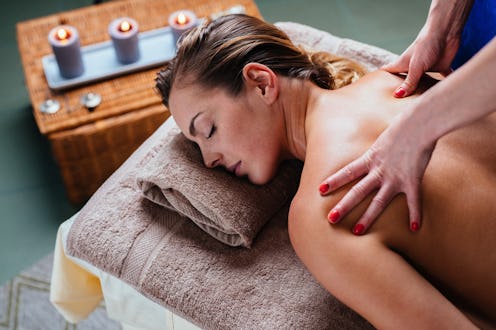(Living)
Massage For Period Relief? Here's What The Practice Can & Can't Do, According To Doctors

There are a few common practices people turn to when they want to relax and destress, and getting a massage is often at the top of that self-care list. For many, simply the fact that it feels good is enough to take your mind off anxiety-inducing things, not to mention that it can be a relief for some physical pain and muscle tension. But there might be a little more to it: According to some experts, one of the surprising health benefits of massage is its effect on your hormone levels.
It seems like in the last few years, there's been a lot of new information about ways to treat hormonal imbalances, like severe period symptoms, PCOS, and endometriosis with lifestyle changes such as diet and exercise. Alisa Vitti, who founded Flo Living and wrote the best-selling book Woman Code is one such champion of this theory. But how does massage fit into all this? Well, there's a two-fold reason that incorporating it into your routine could bring you some much-needed relief.
You probably could have guessed that, considering the physical discomfort some hormonal imbalance can cause, the feel-good factor can go a long way. Massages that focus on acupressure points especially can relieve muscle tension. But the power of physical touch does deeper — pun intended — than even that. "There are many proven health benefits of physical touch, like stimulation of the vagus nerve which activates the parasympathetic nervous system and turns off the 'fight or flight' mode of the sympathetic nervous system that spikes stress hormones," says Dr. Kate Denniston, naturopathic doctor at Los Angeles Integrative Health.
And that's not the only connection between hormones and massage. The lowering of your cortisol levels is another reason getting regular massage could be beneficial if you're someone who suffers from hormonal imbalances. "Dysmenorrhea, which is the medical term for painful periods, as well as endometriosis and PMS result in increased levels of stress hormones namely cortisol, epinephrine, and norepinephrine, which explains increased perception of pain, irritability, tearfulness, etc." says Dr. Mikhail Berman, a hormone specialist.
That said, it's not a cure-all. As Dr. Denniston explains, to really maximize the effects, you must also consider your other lifestyle habits. "Massage is not going to balance hormones without addressing diet, nutrient deficiencies, sleep, exercise, and the way we react to stress on a daily basis," she says. "If you're not having a bowel movement one to two times daily, your gut is likely recirculating estrogen back into the bloodstream, which contributes to estrogen dominance and symptoms like acne, irritability, and painful and heavy periods."
And Denniston adds while massages can be a great accompaniment to those changes, for lasting benefits you want it to be something you can stick to on a regular basis — and for some, this is more of a luxury practice. If you can't afford to get frequent massages, she suggests practicing mediation for some similar cortisol-lowering effects.
If you do want to up your massage practice, you've got some options. The newly opened Lifehood, which is designed around a get-one-give-one concept, offers the "Balance It" massage specifically geared towards balancing hormones with tools and techniques that have a grounding and restoring effect. Dr. Berman adds that aromatherapy can also help. "It has been shown in several studies that addition of aromatherapy to massage increases [these effects on sex hormones]," he explains. And for more serious cases like endometriosis, Dr. Denniston recommends a very specific type of abdominal massage for potential relief. "One particular type of massage called Arvigo may help reduce adhesions or scar tissue and help align the anatomical positioning of the pelvic organs in some women," she says.